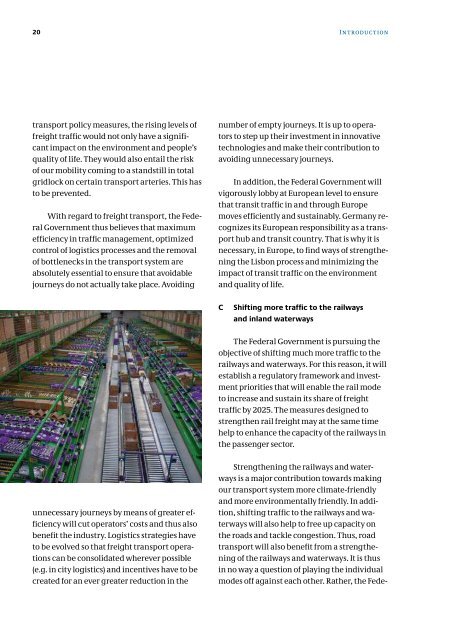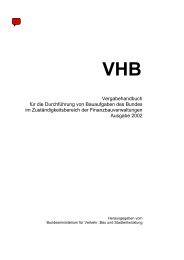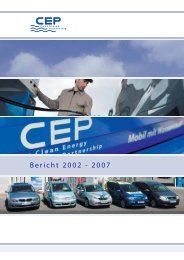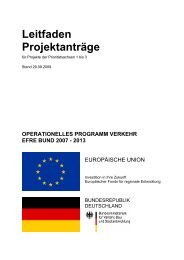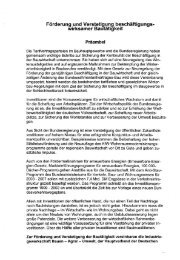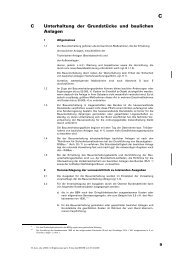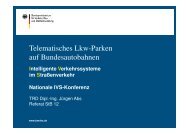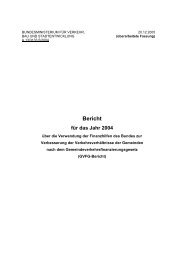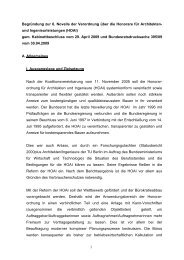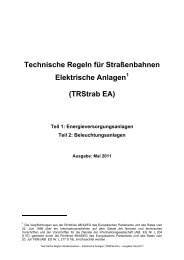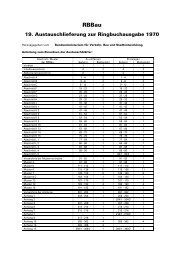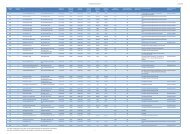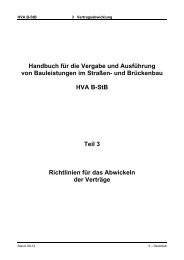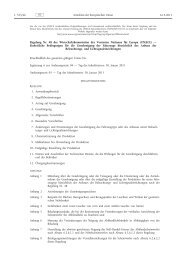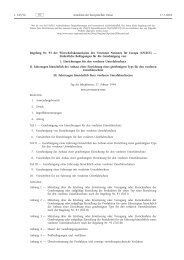Freight Transport and Logistics Masterplan - Bundesministerium für ...
Freight Transport and Logistics Masterplan - Bundesministerium für ...
Freight Transport and Logistics Masterplan - Bundesministerium für ...
You also want an ePaper? Increase the reach of your titles
YUMPU automatically turns print PDFs into web optimized ePapers that Google loves.
0<br />
transport policy measures, the rising levels of<br />
freight traffic would not only have a significant<br />
impact on the environment <strong>and</strong> people’s<br />
quality of life. They would also entail the risk<br />
of our mobility coming to a st<strong>and</strong>still in total<br />
gridlock on certain transport arteries. This has<br />
to be prevented.<br />
With regard to freight transport, the Federal<br />
Government thus believes that maximum<br />
efficiency in traffic management, optimized<br />
control of logistics processes <strong>and</strong> the removal<br />
of bottlenecks in the transport system are<br />
absolutely essential to ensure that avoidable<br />
journeys do not actually take place. Avoiding<br />
unnecessary journeys by means of greater efficiency<br />
will cut operators’ costs <strong>and</strong> thus also<br />
benefit the industry. <strong>Logistics</strong> strategies have<br />
to be evolved so that freight transport operations<br />
can be consolidated wherever possible<br />
(e.g. in city logistics) <strong>and</strong> incentives have to be<br />
created for an ever greater reduction in the<br />
Introduction<br />
number of empty journeys. It is up to operators<br />
to step up their investment in innovative<br />
technologies <strong>and</strong> make their contribution to<br />
avoiding unnecessary journeys.<br />
In addition, the Federal Government will<br />
vigorously lobby at European level to ensure<br />
that transit traffic in <strong>and</strong> through Europe<br />
moves efficiently <strong>and</strong> sustainably. Germany recognizes<br />
its European responsibility as a transport<br />
hub <strong>and</strong> transit country. That is why it is<br />
necessary, in Europe, to find ways of strengthening<br />
the Lisbon process <strong>and</strong> minimizing the<br />
impact of transit traffic on the environment<br />
<strong>and</strong> quality of life.<br />
C Shifting more traffic to the railways<br />
<strong>and</strong> inl<strong>and</strong> waterways<br />
The Federal Government is pursuing the<br />
objective of shifting much more traffic to the<br />
railways <strong>and</strong> waterways. For this reason, it will<br />
establish a regulatory framework <strong>and</strong> investment<br />
priorities that will enable the rail mode<br />
to increase <strong>and</strong> sustain its share of freight<br />
traffic by 2025. The measures designed to<br />
strengthen rail freight may at the same time<br />
help to enhance the capacity of the railways in<br />
the passenger sector.<br />
Strengthening the railways <strong>and</strong> waterways<br />
is a major contribution towards making<br />
our transport system more climate-friendly<br />
<strong>and</strong> more environmentally friendly. In addition,<br />
shifting traffic to the railways <strong>and</strong> waterways<br />
will also help to free up capacity on<br />
the roads <strong>and</strong> tackle congestion. Thus, road<br />
transport will also benefit from a strengthening<br />
of the railways <strong>and</strong> waterways. It is thus<br />
in no way a question of playing the individual<br />
modes off against each other. Rather, the Fede<br />
ral Government’s aim is that, within an integrated<br />
transport system, the individual modes<br />
should be used <strong>and</strong> interlinked in such a way<br />
that they can deploy their inherent strengths<br />
in an optimum manner.<br />
The Federal Government supports<br />
measures that will result in more competition<br />
in rail transport. European integration, with<br />
the opening-up of the market for international<br />
rail freight, is thus viewed positively. The Federal<br />
Government supports the continuation of<br />
European liberalization efforts. The fact that<br />
there is still a lack of harmonization must not<br />
be used as an excuse by individual countries<br />
to back-pedal on liberalization or suspend it.<br />
Enhancing competition in rail transport will<br />
improve its competitiveness vis-à-vis the other<br />
modes of transport. A start should be made<br />
by evolving the regulatory framework. The<br />
Federal Government will also lobby at European<br />
level for fair conditions of competition<br />
between the modes of transport.<br />
D Upgrading more transport arteries<br />
<strong>and</strong> hubs<br />
Avoiding unnecessary journeys, efficient<br />
traffic management <strong>and</strong> a modal shift will not,<br />
by themselves, be sufficient to secure our mobility<br />
in the long term. There are already noticeable<br />
bottlenecks in our transport infrastructure,<br />
<strong>and</strong> the volume of traffic is forecast to<br />
rise significantly. Against this background,<br />
the Federal Government will step up its efforts<br />
to upgrade the transport infrastructure on a<br />
human scale <strong>and</strong> in an environmentally sound<br />
manner. In doing so, it will take account of<br />
noise mitigation as well as the other aspects<br />
of environmental protection <strong>and</strong> nature<br />
conservation, plus the interests of agriculture<br />
<strong>and</strong> forestry. Plans are to be geared to an even<br />
greater extent to the needs of the people in the<br />
local communities.<br />
In order to take account of the future<br />
upgrading requirements as well as the rising<br />
1


